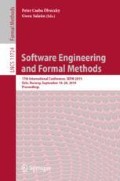Abstract
Inferring a minimal Deterministic Finite Automaton (DFA) from a learning sample that includes positive and negative examples is one of the fundamental problems in computer science. Although the problem is known to be NP-complete, it can be solved efficiently with a SAT solver especially when it is used incrementally. We propose an incremental SAT solving approach for DFA inference in which general heuristics of a solver for assigning free variables is replaced by that employed by the RPNI method for DFA inference. This heuristics reflects the knowledge of the problem that facilitates the choice of free variables. Since the performance of solvers significantly depends on the choices made in assigning free variables, the RPNI heuristics brings significant improvements, as our experiments with a modified solver indicate; they also demonstrate that the proposed approach is more effective than the previous SAT approaches and the RPNI method.
Access this chapter
Tax calculation will be finalised at checkout
Purchases are for personal use only
References
Aloul, F.A., Ramani, A., Markov, I.L., Sakallah, K.A.: Solving difficult SAT instances in the presence of symmetry. In: Proceedings of the 39th Annual Design Automation Conference, pp. 731–736. ACM (2002)
Aloul, F.A., Sakallah, K.A., Markov, I.L.: Efficient symmetry breaking for Boolean satisfiability. IEEE Trans. Comput. 55(5), 549–558 (2006)
Avellaneda, F., Petrenko, A.: FSM inference from long traces. In: Havelund, K., Peleska, J., Roscoe, B., de Vink, E. (eds.) FM 2018. LNCS, vol. 10951, pp. 93–109. Springer, Cham (2018). https://doi.org/10.1007/978-3-319-95582-7_6
Biermann, A.W., Feldman, J.A.: On the synthesis of finite-state machines from samples of their behavior. IEEE Trans. Comput. 100(6), 592–597 (1972)
Brown, C.A., Finkelstein, L., Purdom, P.W.: Backtrack searching in the presence of symmetry. In: Mora, T. (ed.) AAECC 1988. LNCS, vol. 357, pp. 99–110. Springer, Heidelberg (1989). https://doi.org/10.1007/3-540-51083-4_51
De la Higuera, C.: Grammatical Inference: Learning Automata and Grammars. Cambridge University Press, Cambridge (2010)
Eén, N., Sörensson, N.: An extensible SAT-solver. In: Giunchiglia, E., Tacchella, A. (eds.) SAT 2003. LNCS, vol. 2919, pp. 502–518. Springer, Heidelberg (2004). https://doi.org/10.1007/978-3-540-24605-3_37
Freeman, J.W.: Improvements to propositional satisfiability search algorithms. Ph.D. thesis. Citeseer (1995)
Heule, M.J.H., Verwer, S.: Software model synthesis using satisfiability solvers. Empir. Softw. Eng. 18(4), 825–856 (2013)
Marques-Silva, J.: The impact of branching heuristics in propositional satisfiability algorithms. In: Barahona, P., Alferes, J.J. (eds.) EPIA 1999. LNCS, vol. 1695, pp. 62–74. Springer, Heidelberg (1999). https://doi.org/10.1007/3-540-48159-1_5
Moskewicz, M.W., Madigan, C.F., Zhao, Y., Zhang, L., Malik, S.: Chaff: engineering an efficient sat solver. In: Proceedings of the 38th Annual Design Automation Conference, pp. 530–535. ACM (2001)
Oncina, J., Garcia, P.: Inferring regular languages in polynomial updated time. In: Pattern Recognition and Image Analysis: Selected Papers from the IVth Spanish Symposium, pp. 49–61. World Scientific (1992)
Walkinshaw, N., Lambeau, B., Damas, C., Bogdanov, K., Dupont, P.: STAMINA: a competition to encourage the development and assessment of software model inference techniques. Empir. Softw. Eng. 18(4), 791–824 (2013)
Acknowledgments
This work was partially supported by MEI (Ministère de l’Économie et Innovation) of Gouvernement du Québec and NSERC of Canada.
Author information
Authors and Affiliations
Corresponding authors
Editor information
Editors and Affiliations
Rights and permissions
Copyright information
© 2019 Springer Nature Switzerland AG
About this paper
Cite this paper
Avellaneda, F., Petrenko, A. (2019). Learning Minimal DFA: Taking Inspiration from RPNI to Improve SAT Approach. In: Ölveczky, P., Salaün, G. (eds) Software Engineering and Formal Methods. SEFM 2019. Lecture Notes in Computer Science(), vol 11724. Springer, Cham. https://doi.org/10.1007/978-3-030-30446-1_13
Download citation
DOI: https://doi.org/10.1007/978-3-030-30446-1_13
Published:
Publisher Name: Springer, Cham
Print ISBN: 978-3-030-30445-4
Online ISBN: 978-3-030-30446-1
eBook Packages: Computer ScienceComputer Science (R0)

